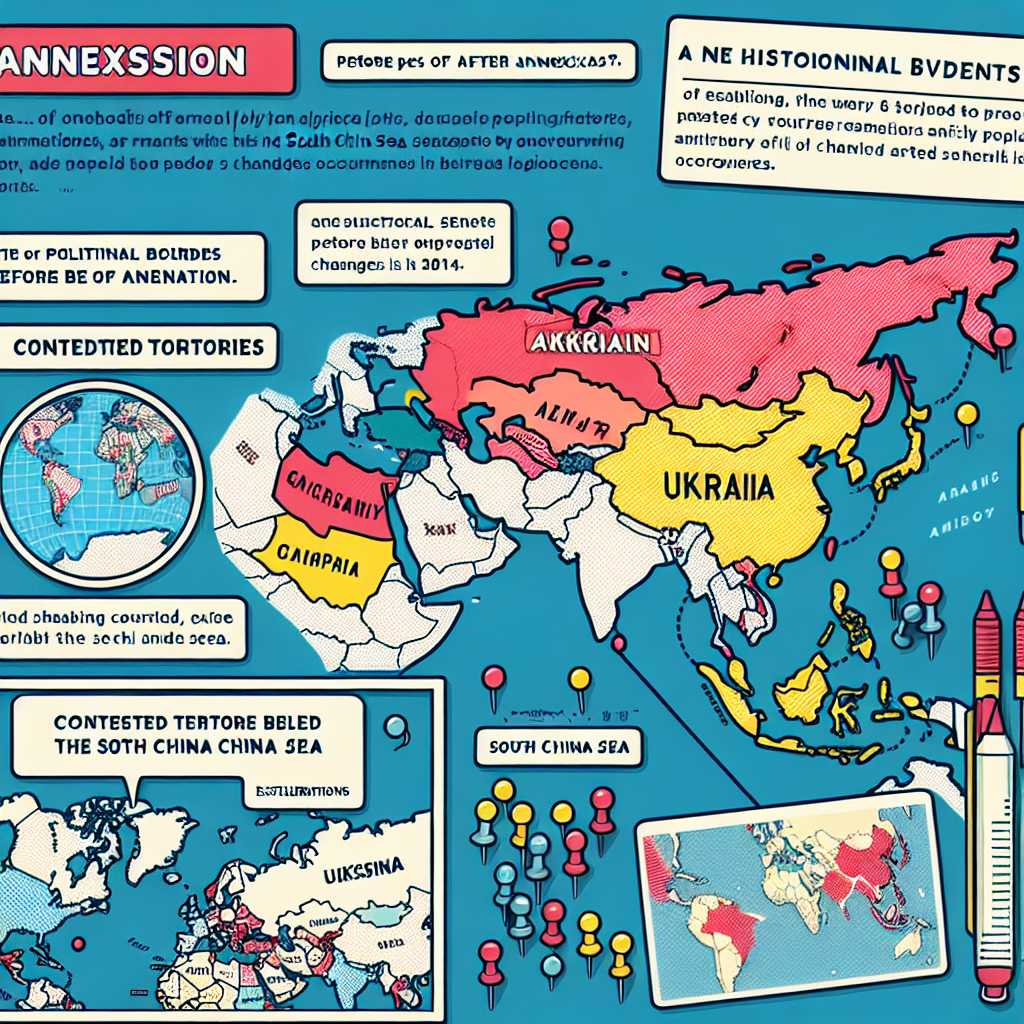The Concept and Purposes of Annexation in the International Context
Annexation is an act through which a state claims sovereignty over territory that is outside its original borders, typically without the agreement of the annexed region’s sovereign authority. This process, wrought with complexity and often steeped in controversy, has played a significant role throughout history and continues to influence international relations today. This article explores annexation from various angles—from its historical roots to its implications in contemporary geopolitics.
Historical Background of Annexation
The notion of annexation is as ancient as civilization itself. Throughout history, empires and kingdoms expanded their reach by claiming lands beyond their borders. The causes behind these actions varied from the desire for more resources or strategic advantages to ideological or religious motives. Examples include the Roman Empires Annexation of various territories across Europe and the Mediterranean, the expansionist policies of colonial powers such as Great Britain, France, and Spain, as well as the United States’ Manifest Destiny, which led to the annexation of considerable parts of what is now its southwestern states.
Legal Perspectives and International Law Constraints
In modern times, annexation is a highly regulated act under international law, shaped primarily by the principles laid out in the Charter of the United Nations. Annexation achieved through military conquest or coercion is generally considered illegal under current international norms. Self-determination—which allows peoples to define their own statehood and government—opposes nonconsensual territorial acquisition. UN resolutions, such as those concerning Israel and the Golan Heights, reaffirm this legal framework by denouncing acquisitions made by force. Annexation must therefore proceed in adherence to international laws and agreements, failings which carry geopolitical repercussions and enforcement measures from bodies like the United Nations.
Political Implications of Annexation
Annexation carries profound political implications. It can significantly alter power balances regionally and internationally, stir diplomatic tensions, or trigger sanctions and collective responses from supranational organizations such as the United Nations or regional alliances like NATO or the EU. Annexations could lead to conflicts or even war if disputed territories hold significant strategic or economic value or if they possess symbolic importance to one or both parties involved.
Social and Humanitarian Concerns Arising from Annexation
From a humanitarian perspective, annexation can be disruptive to the lives of those within targeted territories. There may be outbreaks of violence; erosion of established cultural, legal or political systems; forced migrations; and losses of human rights protections. The consequences for day-to-day life can range from disruptions in social services and economic downturns to psychological traumas caused by conflicts and dislocation.
Economic Effects of Territory Annexation
Economic factors also weigh heavily in annexations. A region rich in natural resources could entice countries to extend sovereignty for economic gain. Yet these actions often meet with trade constraints, sanctions, and divestment movements penalizing regions responsible for inadmissible annexations. Moreover, contested sovereignty statuses can discourage foreign investment and leave economies teetering on uncertainty.
Recent Examples and Case Studies of Annexation
In recent years, multiple high-profile annexations have revealed various ways that states go about territorial expansion and unveil different types of international reaction pertaining to universally accepted norms:
– The annexation of Crimea by Russia in 2014 serves as a recent example. It highlighted issues around ethnic ties—given a Russian speaking majority in Crimea—and strategic motives due to Crimean ports offering naval access to Russia.
– China’s territorial claims over parts including parts of the Himalayas against India as well as the South China Sea affect several Southeast Asian nations continue to pose serious challenges.
Notes
– International law typically regards annexation resulting from aggression as illegal.
– Annexations can shift territorial control, with significant impact on citizens’ lives.
– Economic sanctions may pursue states that engage in globally unackroved annexations.
– Self-determination as a concept pushes back against the idea of annexing territories without the inhabitants’ consent.
– Strategic locations are often hotspots for annexing ambitions due to commercial routes or resources.

